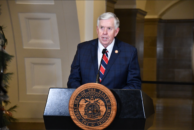The idea that a simple majority of voters could pass an amendment to the Missouri Constitution is preposterous. But in reality, it is even worse than that. In a typical November general election in the state of Missouri, there is about a 60-65 percent turnout. In simple terms, this means that 50 percent +1 of that 60 percent is all that is needed to amend our constitution. In even simpler terms, that means that 30 percent of registered voters can amend the constitution.
When one compares Missouri’s constitution to that of other states, we can clearly see that something has gone awry. Our constitution is the fifth-longest of all states, coming in at a whopping 69,394 words. The concern is, of course, that any organization with deep enough pockets will be able to use the initiative petition process to put issues on the ballot. Those deep pockets will also be able to fund an ad campaign that only has to convince 30 percent of registered voters to support the issue. Recently, we have seen this scenario play out with the passage of the Soros-backed Amendment 1 in 2018, so-called Clean Missouri. The amendment was billed as a way to clean up Missouri politics and reduce the influence of lobbyists in the state Capitol. But the devil was in the details, with the true goal being altering the redistricting process to ostensibly favor one party, in this case, the Democrats. Naturally, GOP operatives and elected officials exposed these details and added a little window dressing of their own to pass Amendment 3 in 2020, dubbed Cleaner Missouri.
I point out this example not to criticize one party or the other, but to show how easily a pile of cash and a slick ad campaign could have possibly led to a disastrous redistricting process that would have had people yearning for the genteel gerrymandering of yesteryear. So, with all of that said, what are some of the solutions to address this glaring problem. Several House Joint Resolutions (HJRs) have been filed this year by Republican lawmakers that seek to change the initiative petition process in Missouri.
HJR 79 proposed by Rep. Mike Henderson (R-117) would require a constitutional amendment to achieve a two-thirds supermajority to pass and would require the petitioner to gather signatures of at least 10 percent of registered voters in each of the eight congressional districts. Currently, the signatures of 8 percent of registered voters in six of the eight congressional districts are required to get language on the ballot. This measure, which would have to go to a vote of the people, ensures that a consensus of registered voters in our state supports the constitutional amendment in question.
HJR 70 proposed by Rep. Bishop Davidson (R-130) takes what I believe to be a more nuanced approach to increase the difficulty of passing constitutional amendments submitted by initiative petition. Similar laws are used in Wyoming and Mississippi to ensure that small minorities of voters cannot pass constitutional amendments. HJR 70 requires that these amendments be passed by a majority of all registered voters, not only the majority who vote on that particular amendment on election day.
HJR 97 filed by Rep. John Simmons (R-109) would require initiative petition signatures to be gathered in two-thirds of the counties of the state for constitutional amendments proposed by initiative petition. This HJR would also keep the needed signatures at the current 8 percent. It would increase the threshold to two-thirds for passage of the amendment. It’s important to mention that this HJR would guarantee that a broad and diverse cross-section of our state’s electorate support the constitutional amendment by requiring that signatures be gathered in two-thirds of counties. Currently, if the petitioner avoids gathering signatures in the more rural sixth and eighth congressional districts, they disregard all or part of 66 counties. More than half the counties in the state.
There are several variations of the aforementioned HJRs that lawmakers can use to clamp down on the abuse of the initiative petition process. In my opinion, the simpler the better. This will have to go to a vote of the people and the opposition will of course frame it as an attack on their ability to influence public policy. But just like Cleaner Missouri, it doesn’t seem likely that this effort will attract big money in support of its passage. Elected officials will have to use a grassroots effort to inform their constituents why this is in the public’s interest, and why they should support this necessary constitutional change. The deleterious effects of unfettered constitutional change funded by out-of-state money will continue to reverberate across this state for years to come unless we can find a way to pass initiative petition reform.

Scott Bell is a legislative assistant in the Missouri House of Representatives. He was previously an elections specialist at the Missouri Secretary of State’s Office. He is a native of Franklin County who studied political science at the University of Missouri – St. Louis and resides in Columbia.













